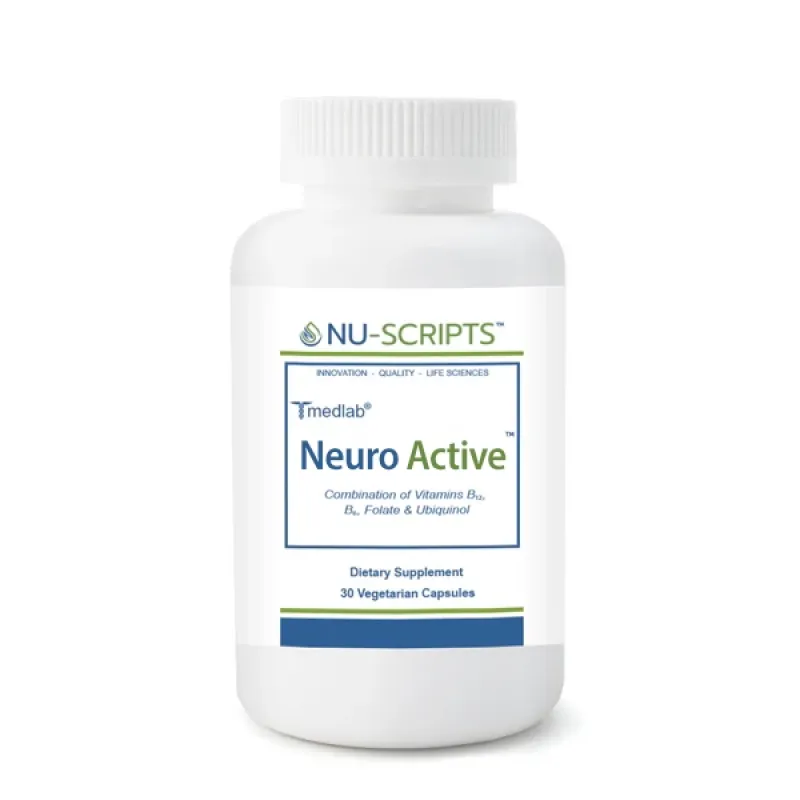NeuroActive™
- $39.99
- Quantity Tier Pricing
- 2 or more $29.99
- 12 or more $21.99
Nutritional Support for Neurologic Function
1. Calcium
Overview:
Calcium is an essential mineral critical not only for skeletal integrity but also for neuronal excitability, neurotransmitter release, and synaptic communication. It plays a central role in the electrical signaling and metabolic regulation of nerve cells.
Health Benefits for Neurologic Function:
-
Neurotransmission:
Facilitates synaptic vesicle fusion and neurotransmitter release at nerve terminals. -
Nerve Excitability:
Maintains the electrical stability of neuronal membranes, supporting proper nerve conduction. -
Neuroplasticity:
Participates in intracellular signaling pathways essential for learning, memory, and adaptive brain function. -
Neuroprotection:
Balanced calcium levels prevent excitotoxicity, a condition resulting from excessive neuronal stimulation.
Clinical Insight:
Adequate calcium intake supports normal neuromuscular signaling and prevents symptoms such as muscle twitching, paresthesia, and irritability associated with calcium imbalance. Calcium works synergistically with magnesium and vitamin D to maintain optimal neuronal stability.
2. Vitamin B6 (Pyridoxine)
Overview:
Vitamin B6 functions as a coenzyme in over 100 enzymatic reactions, many of which are central to neurotransmitter synthesis, amino acid metabolism, and homocysteine regulation.
Health Benefits for Neurologic Function:
-
Neurotransmitter Synthesis:
Essential for the production of serotonin, dopamine, γ-aminobutyric acid (GABA), and norepinephrine — neurotransmitters that regulate mood, alertness, and relaxation. -
Myelin Formation:
Supports the biosynthesis of sphingolipids, structural components of neuronal myelin sheaths. -
Homocysteine Regulation:
Along with folate and vitamin B12, maintains optimal homocysteine metabolism to protect vascular and neuronal integrity. -
Cognitive and Mood Support:
Contributes to stable mood, mental focus, and cognitive endurance.
Clinical Insight:
Deficiency in vitamin B6 can manifest as neuropathy, depression, irritability, or cognitive impairment. Optimal B6 levels are critical for maintaining neurotransmitter balance and neurometabolic efficiency.
3. Folate (Vitamin B9)
Overview:
Folate plays a fundamental role in one-carbon metabolism, facilitating DNA synthesis, methylation, and neurotransmitter production. It is essential for both neural development and ongoing neural repair.
Health Benefits for Neurologic Function:
-
Methylation and Neurotransmitter Regulation:
Participates in the methylation of homocysteine to methionine, supporting synthesis of S-adenosylmethionine (SAMe), a universal methyl donor crucial for serotonin, dopamine, and norepinephrine balance. -
DNA Repair and Neurogenesis:
Supports the production and repair of neuronal DNA, contributing to cognitive maintenance. -
Vascular and Cognitive Protection:
Reduces homocysteine levels, supporting cerebrovascular health and preventing neurovascular injury. -
Prenatal Neurologic Development:
Prevents neural tube defects and supports fetal brain development during pregnancy.
Clinical Insight:
Folate deficiency is strongly associated with depression, cognitive decline, and neuropathy. Activated forms such as 5-MTHF (5-methyltetrahydrofolate) are preferred for individuals with methylation impairments (e.g., MTHFR gene variants).
4. Vitamin B12 (Cobalamin)
Overview:
Vitamin B12 is essential for myelin synthesis, neuronal metabolism, and methylation reactions. It serves as a cofactor for enzymes involved in DNA synthesis and homocysteine regulation.
Health Benefits for Neurologic Function:
-
Myelin Maintenance:
Essential for the formation and preservation of myelin, the insulating sheath surrounding nerves. -
Neurotransmitter and Energy Metabolism:
Supports synthesis of monoamine neurotransmitters and promotes efficient neuronal energy production. -
Cognitive Health:
Helps maintain mental clarity, concentration, and memory. -
Neuroprotection:
Reduces homocysteine and oxidative stress, mitigating neuroinflammatory damage.
Clinical Insight:
Deficiency in vitamin B12 leads to peripheral neuropathy, cognitive decline, and mood disturbance. Methylcobalamin and adenosylcobalamin forms of B12 are most bioavailable for neurological applications.
5. Ubiquinol-10 (Reduced Coenzyme Q10)
Overview:
Ubiquinol-10 is the reduced, active form of Coenzyme Q10 (CoQ10), a lipid-soluble antioxidant and critical component of the mitochondrial electron transport chain. It plays an indispensable role in cellular energy metabolism and neuroprotection.
Health Benefits for Neurologic Function:
-
Mitochondrial Energy Production:
Facilitates ATP generation in neuronal mitochondria, supporting sustained neural function. -
Antioxidant Defense:
Neutralizes lipid peroxides and protects neuronal membranes from oxidative damage. -
Neuroprotective and Anti-inflammatory Action:
Reduces oxidative stress and microglial activation associated with neurodegenerative processes. -
Cognitive Support:
Enhances mental clarity and supports mitochondrial efficiency in aging neurons.
Clinical Insight:
Ubiquinol supplementation has been shown to support patients with mitochondrial dysfunction, neurodegenerative conditions, or chronic fatigue syndromes, promoting cellular vitality and cognitive endurance.
* Please be aware that packaging displayed on our website may vary from your order based on factors such as availability and supplier changes, or to improve the readability of product details.
* These statements have not been evaluated by the Food and Drug Administration. This product is not intended to diagnose, treat, cure, or prevent any disease.
Tags: medlab fxneuro , medlab neuroactive , fxneuro , neuroactive , medlab fx neuro , medlab neuro active , fx neuro , neuro active ,






